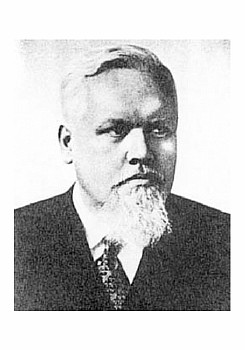|
- - - -
Oskar Anderson
Anderson Oskar Nikolaevich
(02.08.1887–12.02.1960)
Scientist in the sphere of mathematical and economic statistics; founder of scientific schools of statistics in Bulgaria and Germany
Oskar Anderson was born in Minsk. He finished Kazan Gymnasium in Russia in 1906, was a student of the University of Kazan. In 1912, he was graduated from St.-Petersburg Polytechnic Institute and received a Candidate of Economics degree. Since 1917, Anderson held two positions, one in Kiev Commercial Institute and the other, in the Demographic Institute of the Ukrainian Academy of Science. Since 1924, he became Professor Extraordinarius. The scientist was a professor of Varna Commercial Institute (Bulgaria) from 1929 until 1933. Since 1935, Anderson became the first director of the Statistics Institute of Economic Researches of the University of Sofia (Bulgaria). In 1942 he accepted a chair at the University of Kiel, became a head of statistics department of the University of Munich (Germany) since 1947. Oskar Anderson died in Munich.
Anderson is the author of scientific works on mathematical and economic statistics, probability theory, non-parametric methods of statistics, quantity theory of money. In his thesis, irrespectively of English scientist William S. Gosset, worked out a variance-difference methods for analyzing time series. He was the first one to use representative method for studying the productivity of farming industry during the expedition to Turkestan in 1915. Anderson participated in processing of census data of the year 1926, made a great contribution into the processing of data of farming industry output in 1931–1932, and in 1938, he published a report concerning general state of the Bulgarian economy. In his works he tried to unite the traditions and ideas of the continental (German and Russian), classical English and modern American schools of mathematical statistics. Oskar Anderson was an associate member of the League of Nations Committee of Statistical Experts in 1936–1939, one of the founders and a member of the Econometric Society (1933), a member of the American Statistical Association (1952), Honorary Member of the Royal Statistical Association of Great Britain (1956).
Works:
1. Einfuhrung in die mathematische Statistik. Wien, 1935.
2. Probleme der statistischen Methodenlehre in den Sozialwissenschaften. 4 Auflage. Wurzburg, 1962.
3. Ausgewahlte Schriften. Bd. I/II. Tubingen, 1963.
Literature:
1. Fels E. M. Anderson, Oskar N. // International Encyclopedia of Statistics. Vol. 1. New York, 1978. P. 1–3.
2. Sheynin O. B. Anderson, Oskar Johann Viktor // Dictionary of Scientific Biography. Vol. 1. N.Y., 1970. P. 154–155.
3. Anderson, Oskar (Nikolaevich) Johann Viktor // Leading personalities in statistical sciences. Eds. N.L. Johnson and S. Kotz. New York, 1997. P. 176–178.

© National Academy of Sciences of Belarus, 2011
|
|


